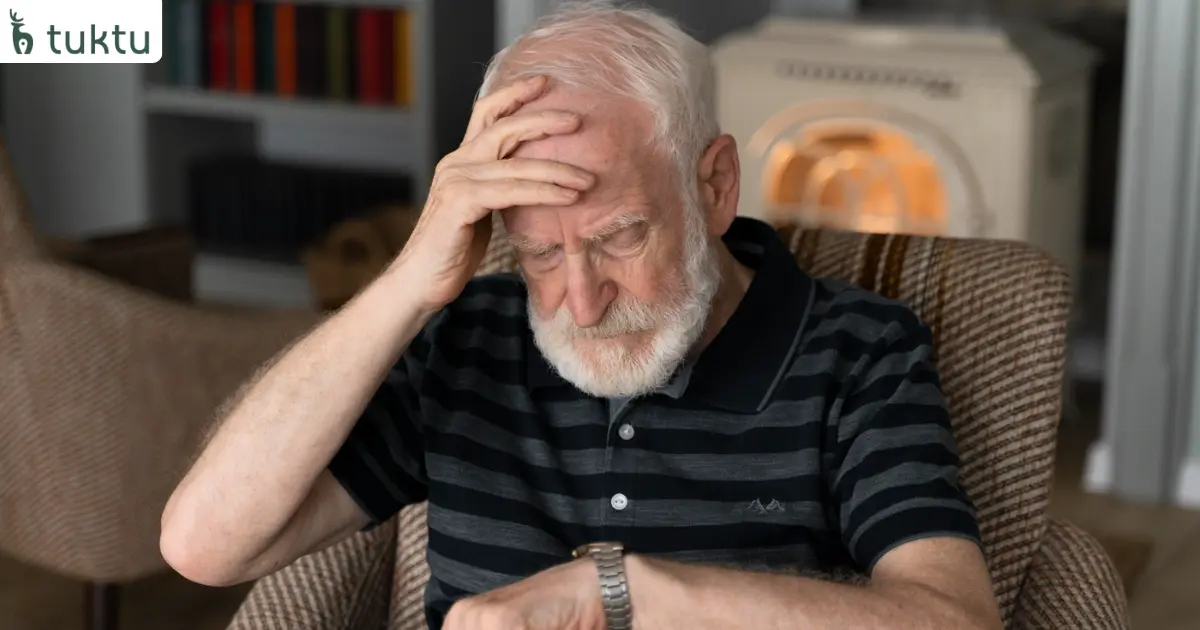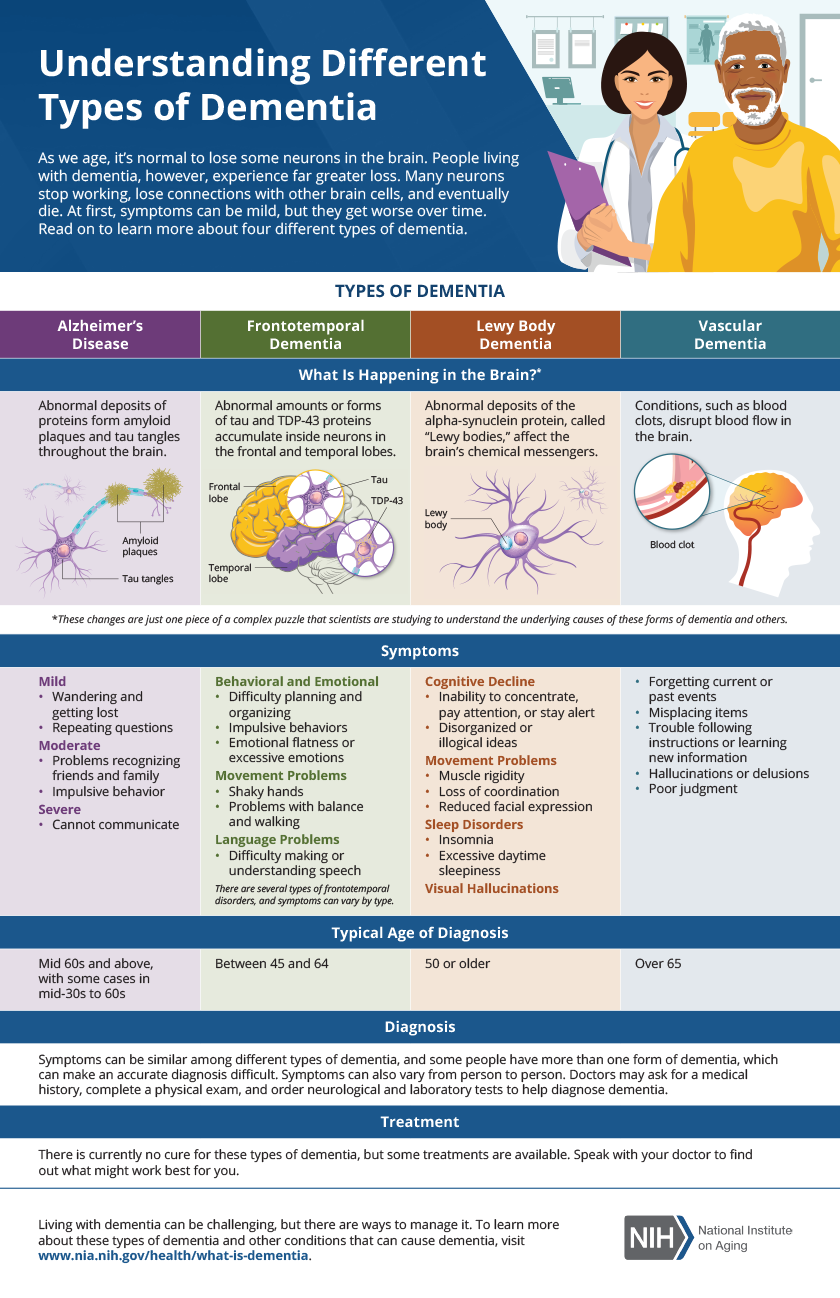What are Some Common Types of Dementias?

Hearing the diagnosis of dementia for the first time can be a cause of immense anxiety. You may feel like you are faced with a future suddenly filled with uncertainty. The realization that a loved one is facing this condition brings a flood of emotions — fear, sadness, and confusion.
Understanding the different types of dementia can feel overwhelming, but it is also the first step in providing the care and support that our loved ones need. In this blog, we will explore the various types of dementias, shedding light on each condition to help you better understand and support those affected. Whether you are a caregiver, a family member, or someone seeking information, our goal is to provide you with the knowledge and emotional support to navigate this challenging path.
What is dementia?
Dementia refers to several neurological conditions which worsen over time. It is a general term applied to the loss of memory and mental abilities that are severe enough to affect daily living. People with dementia experience physical changes in their brains, losing many neurons. Their neurons stop working, lose connections with other brain cells, and eventually die. There are about 40 different types of Dementia diagnosed around the world, here are seven most commonly found types of dementia:
1. Alzheimer’s disease:
It is the most common type of dementia caused by abnormal deposits of proteins forming plaques and tangles throughout the brain. It is mainly diagnosed in people in their mid-60s and above. However, some adults may present symptoms in their mid-30s
Alzheimer’s disease has seven stages while symptoms usually appear in Stage 2. Cognitive impairment worsens gradually until Stage 7 when most people face severe challenges in speech and movement.
Symptoms:
Mild
- Forgetting recent events
- Wandering and getting lost
- Repeating questions
Moderate
- Problems recognizing friends and family
- Impulsive behaviours
Severe
- Inability to communicate
To understand more about Dementia - watch the webinar by Tuktu Care with guest Diane Doyle, an expert in Dementia care with over 20 years of experience working with seniors.
2. Lewy body dementia
This type of dementia is caused by abnormal deposits of protein, called “Lewy bodies,” affecting the brain’s chemical messengers. The age for diagnosis is usually above 50 years.
Symptoms:
Cognitive Decline
- Inability to concentrate, pay attention, stay alert
- Disorganized and illogical ideas
Mobility Issues
- Muscle rigidity
- Reduced facial expressions
- Loss of coordination
Sleep Disorders
- Insomnia
- Excessive daytime sleepiness
Visual Hallucinations
3. Frontotemporal dementia
Frontotemporal dementia is caused by abnormal amounts or forms of proteins accumulating inside neurons on the frontal and temporal lobes. It may affect people as early as 45 years of age.
Symptoms:
Behavioral and Emotional
- Difficulty planning and organizing
- Impulsive behaviours
- Lack of emotions or excessive emotions
Mobility Issues
- Shaky hands
- Problems with balance and walking
Language Issues
- Difficulty talking or understanding speech
4. Vascular dementia
Vascular dementia is caused by disrupted blood flow to the brain, which may be caused by blood clots. The typical age of diagnosis is over 65 years. People who have had strokes or heart attacks are at more risk of developing this type of dementia.
Symptoms:
- Forgetting current or past events
- Confusion and disorientation
- Inability to follow instructions and learn new information
- Hallucinations and delusions
- Poor judgement

5. Parkinson’s Disease
Parkinson’s disease is a neurological disorder where the brain is unable to produce sufficient amounts of the neurotransmitter dopamine. The majority of people with Parkinson’s develop dementia. It is progressive
Symptoms:
Cognitive
- Trouble understanding visual information
- Irritability
- Hallucinations
Mobility Issues
- Tremors in hands, arms and legs
- Postural instability and gait disturbance (PIGD)
6. Huntington’s Disease
Huntington’s disease is a genetic disorder. People carrying the gene for Huntington’s usually begin experiencing symptoms around the ages of 30 to 50. Associated symptoms usually affect mobility, causing impaired movement such as trouble swallowing, difficulty walking and jerking. Other symptoms are similar to those experienced in other forms of dementia.
7. Normal Pressure Hydrocephalus
This type of dementia is caused by an abnormal buildup of cerebrospinal fluid in the brain causing excessive pressure. Diagnosing NPH may take time but it also one of the types of dementias, which can sometimes be cured with surgery.
Symptoms:
- Poor balance
- Forgetfulness
- Frequent falls
- Loss of bowel or bladder control
In addition to the types of dementias described above, several other types of dementias exist. It is important to educate yourself when you, a family member, or a close friend develop dementia. Although it is difficult, learning about dementia is the first step to taking care of yourself and others with the condition. Understanding the symptoms of dementia is the first step to being prepared for the journey ahead. Knowing dementias enables you to create more compassionate and effective care, ensuring your loved one receives care tailored to their needs.
As challenging as dementia can be, understanding its types and symptoms is the first step towards managing the condition effectively. With the right knowledge and support, you can ensure that your loved ones receive the care they need to live as well as possible. At Tuktu Care, we are dedicated to providing specialized dementia care that respects the individuality and needs of each person. Our services are designed to offer support, alleviate stress, and promote quality of life for both individuals with dementia and their caregivers. For more information on how Tuktu Care can assist you or your loved one in managing dementia, please visit our website. Together, we can navigate the complexities of dementia with greater confidence and compassion.
For further details and support on managing dementia, consider watching Tuktu Care's webinar featuring expert Diane Doyle, who has over 20 years of experience in senior dementia care.


